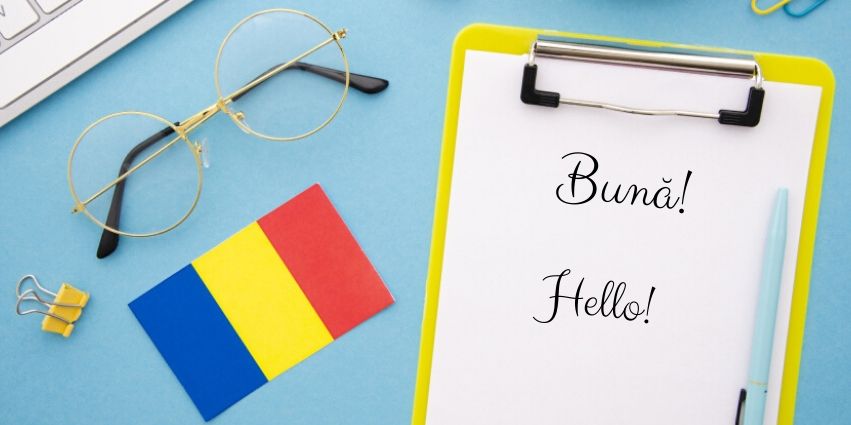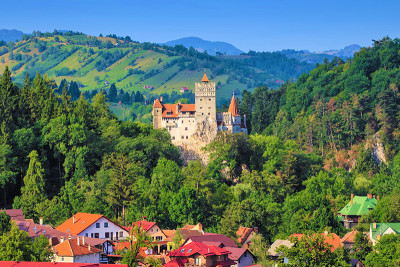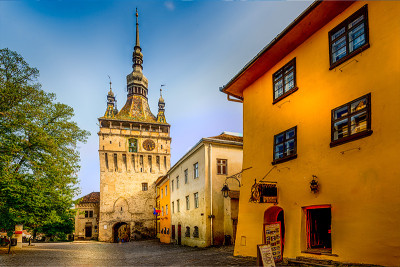Alright, so you don’t speak Romanian yet and maybe you are thinking, “surely there will be English speakers in Romania?!” The truth is yes, plenty of Romanian speak English fluently or could at least help you out if you spoke to them in English.
In addition, if you know French or German or perhaps another Eastern European language, you will probably be able to get around just fine in Romania. However, locals will definitely appreciate it if you make an effort to learn their language, even if you only are able to learn a couple of phrases before you go.
Dale Carnegie once wrote “to be interesting, be interested.” And although you might not be going to Romania to make friends or to get people to be “interested” in you, if you show interest in Romania culture it will make the locals like you a bit more.
While you are abroad, should interest in the language and culture and don’t be afraid to ask questions. You will find that locals really appreciate the effort and will be more likely to give you better service or willing to help you out – whether it’s with directions, food recommendations, pronunciation help or other.
Aside from gaining the favor of the locals, it can be helpful in and of itself to be able to at least recognize a few key words in the Romanian language while you are out and about traveling.
There are many ways to learn Romanian. If you have time before your trip, you could perhaps listen to audio lessons, borrow some language books from your local library, or download Duolingo to learn some Romanian on the go.
This is simply a written guide to help you recognize some of the vocabulary. You can copy and paste any of these words into Google Translate (translate.google.com) to listen to the pronunciation. Some of the phrases below have a basic pronunciation guide too for your benefit.
Let’s start with some of the basics that you might need when walking into a restaurant, shop, or café, or when you are meeting someone for the first time.
Greetings
Bună dimineaţa!
[boo-na di-mi-natz-a]
Good Morning!
Cum ești?
[koom ee-yeshti]
How are you?
Bine, mersi. Și tu?
[been-eh, mercy. She too]
Fine, thanks. And you?
Şi eu sunt bine.
[she yeow sunt been-eh]
I’m fine too.
Mulțumesc
[mult-oo-mesk]
Thank you.
Salut
[sah-loot]
Hi
Bună ziua
[boon-a zee-wa]
Good day
Bună seara
[boon-a sa-rah]
Good evening
Noapte bună
[nwap-tay boon-a]
Good night
Bună, mă numesc Maria.
[boon-a, ma noom-esk Maria]
Hi, my name is Maria.
Care e numele tău?
[car-eh eh noom-el-eh tao]
What’s your name?
Încântat de cunoștință.
[in-can-tat deh koo-no-shtin-zeh]
Nice to meet you.
At A Restaurant
Restaurant
Restaurant
Alimente
Food
Masa
Table
Rezervare
Reservation
Putem vă rog să avem factura?
Can we please have the bill?
Scuzaţi-mă. Aveţi un meniu?
Excuse me. Do you have a menu?
Excuse me can be said in two ways:
Scuză-mă! when you are talking in an informal way.
Scuzați-mă! when you are talking in a polite way.
Vă rog – Please (literally I beg you)
Food
Apă – Water
Pâine – Bread
Sifon – Soda
Bere – Beer
Vin – Wine
Carne – Meat
Brânză – Cheese
Porc – Pork
Vită – Beef
Pui – Chicken
Nuci – Nuts
Alergii – Allergies
Places
Unde – Where
Momentan – At the moment
La – To
Școală – School
Firmă – Firm
Magazin – Store
Acasă – Home
Aeroport – Airport
Parc – Park
Departe – Far
Aproape – Near
Ţară – Country
România – Romania
Anglia – England
Franţa – France
Statele Unite – USA
Germania – Germany
Ungaria – Hungary
Italia – Italy
Grecia – Greece
After you have made it through these basic words and phrases, there are a few more things you should note about the Romanian language. First, as you have probably noticed, is that the Romanian alphabet looks basically the same as the English alphabet. The difference is that the Romanian alphabet has five special characters, for a total of 31 letters. The additional letters are:
Ă ă
 â
Î î
Ș ș
Ț ț
Other than the above letters, Romanian does not have accents on other letters, including vowels. Although accents can help ease pronunciation, at least you won’t have to worry about adding that to the list of things you have to memorize when learning Romanian!
If Romanian is not the first foreign language you have learned, then you are probably wondering about verb conjugation. Conjugating verbs in Romanian is not particularly difficult, but it isn’t easy either. We will have to save verb conjugations for another lesson. For now, if you are interested in learning some verbs and their conjugations, you can check out these popular verbs, conjugated in the present tense below:
eu sunt – I am
tu ești – You are
el/ea este/e – He/She is
noi suntem – We are
voi sunteți – You are (plural)
ei/ele sunt – They are
eu am – I have
tu ai – You have
el/ea are – He/She has
noi avem – We have
voi aveți – You have (plural)
ei/ele au – They have
So there you have it, your very first Romanian language lesson! Whether this is the first foreign language you are learning or your fourth, you are probably going to make tons of mistakes when you first start out with this language.
But it is ok to make mistakes! It is through the mistakes that you are able to learn and grow. If you never practice your foreign language, then it will be impossible, or at least very hard, to ever improve. You cannot just memorize words on your own and expect to one day speak the language fluently.
Anyway, so few English-speakers decide to pick up Romanian, your initiative to do so will not only be seen as impressive, but admirable. So learn this list and continue learning beyond it!
The path to learning a new language is fun, challenging, rewarding, and exciting. We hope that visiting the beautiful country of Romania will allow you to continue to grow in your language-learning journey!

 ES
ES
 IT
IT
 DE
DE
 FR
FR


